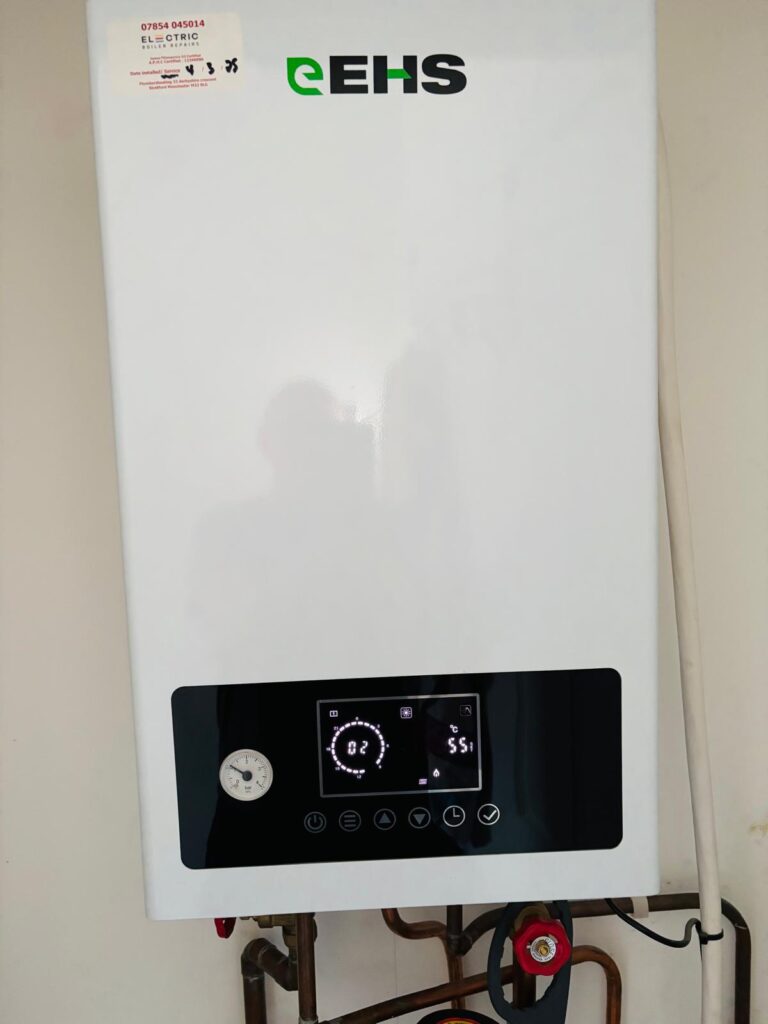We fixed this 12 kW electric Combi boiler
Problem: No Hot Water inside the Electric Combi Boiler

Electric Heating Syetems company make this is a 12 kw combi boilers model for smaller apartments or flats, the problem with this particular model was there was no hot water inside the electric combi boiler.
We identified the problem was being caused by a failed PCB. We decided to remove the PCBs and swap them around which solved the problem. It saves the customer having to buy buying one, installing it and finding out it hasn’t solved the issue.
How does an electric combi boiler work?
An electric combi boiler (combination boiler) is a compact, energy-efficient heating system that provides both central heating and instant hot water using electricity as its power source—no gas or fossil fuels are required. Here’s how it works:
Key Components & How They Function
-
Electric Heating Elements
-
Instead of a gas burner, an electric combi boiler uses immersion heaters or resistive heating elements to heat water directly.
-
When heating is required, electricity flows through these elements, converting electrical energy into heat.
-
-
Heat Exchanger (for some models)
-
Some advanced models use a thermal store (a small insulated water tank) or a heat exchanger to transfer heat efficiently.
-
However, many electric combi boilers heat water on demand without a storage tank.
-
-
Hot Water on Demand (Like a Gas Combi Boiler)
-
When you turn on a hot tap, cold water passes through the boiler, where it is instantly heated by the electric elements before being delivered to the tap.
-
No hot water storage means no risk of running out, but flow rate may be limited by the boiler’s power.
-
-
Central Heating Loop
-
For radiators or underfloor heating, the boiler heats water in a closed loop system.
-
A circulating pump moves the heated water through the radiators before returning it to the boiler for reheating.
-
-
Controls & Thermostats
-
Modern electric combi boilers have digital controls for setting temperatures and scheduling heating.
-
Some models integrate with smart thermostats for better efficiency.
-
Advantages of Electric Combi Boilers
✔ No gas or flue required – Safe, no carbon monoxide risk.
✔ Compact & quiet – No bulky tank or burner noise.
✔ High efficiency (near 100%) – Almost all electricity is converted to heat.
✔ Lower maintenance – No gas-related parts to service.
✔ Eco-friendly (if using renewable electricity) – Zero direct emissions.
Disadvantages
✖ Higher running costs – Electricity is often more expensive than gas.
✖ Limited hot water flow rate – May struggle with multiple taps/showers running at once.
✖ Dependent on electrical supply – Power outages can disrupt heating.
Best For:
-
Homes without gas supply (e.g., rural areas).
-
Small to medium-sized homes with moderate hot water demand.
-
Eco-conscious users with solar panels or green energy tariffs.
